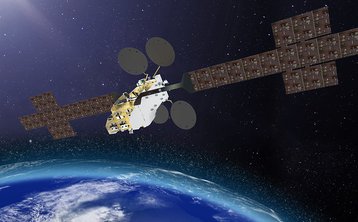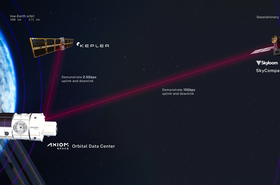It appears Viasat is changing the plans around Inmarsat’s Orchestra satellite constellation.
First reported by Advanced Television, Viasat has written to the FCC withdrawing its applications for V-band satellite spectrum.
“Viasat’s wholly owned subsidiary, Inmarsat Inc., is today withdrawing its application for authority to access the US market with a planned NGSO system using portions of the V-band,” the company said.
Neither company has made a public announcement on the application withdrawal.
Viasat told DCD: "Viasat chose to withdraw a pending application for FCC authority to access the US market using the V-band, originally submitted by Inmarsat prior to the acquisition. The withdrawal was done in response to the sole condition set by the FCC to complete the acquisition, which relates to a rule that precludes a single entity from holding or seeking multiple authorizations for unbuilt NGSO systems that would operate in the same frequency band. Viasat already has an existing, approved application for V-band access to the US market."
Inmarsat, prior to its acquisition by US-based Viasat, had planned to launch a fleet of low Earth orbiting (LEO) satellites known as Orchestra.
First announced in July 2021, Orchestra was to combine Inmarsat’s existing GEO satellites – both GX and L-band – with a new “small constellation” of 150-175 LEO satellites, while terrestrial 5G would add capacity in "hot spots" such as ports, airports, and sea canals.
In November of that year, the company requested US market access in the V-band with the FCC for its Orchestra constellation, comprising 198 satellites.
Inmarsat already has a test satellite in orbit which is testing new concepts and system configurations for Orchestra’s proposed LEO constellation.
The recently-acquired satellite firm posted about the promise of Orchestra on Twitter (now X) this week, saying: “Communication lies at the heart of everything we do and being in touch no matter where you are is an expectation. Orchestra will combine multiple orbits & 5G into a single seamless solution so you don’t have to worry about getting connected – you just are.”
Eutelsat cans IoT LEO satellite plans
SpaceIntelReport reports Eutelsat has shelved plans for a commercial IoT constellation.
First announced in 2019, the company planned to launch 25 nanosatellites – known as ELO (Eutelsat LEO for Objects) – to serve IoT use cases. It was to offer low-power, wide-area wireless technology (LPWA) services for IoT terrestrial networks.
The company – which is currently undergoing a merger with LEO satellite firm OneWeb – had launched five test satellites, but the plans have been put on “indefinite hold,” according to Vijay Thakur of Eutelsat’s Satellite Technical Authority.
The program has been downgraded to an R&D effort.
The first test satellite, known as ELO Alpha and built by Terran Orbital, was launched in 2021. ELO 1 and 2 were hosted payloads aboard Loft Orbital machines also launched in 2021. The Clyde space-made ELO 3 and 4 were set to launch earlier this year, but the company never confirmed they had been put into orbit (though ELO 3 likely has been launched).
Eutelsat’s new 10B GEO satellite is now serving customers. The Ku- and C-band satellite, built by Thales Alenia Space, launched in November 2022. It is set to replace 10A, which is reaching the end of its lifespan.
In other satellite news:
- Telesat recently launched its LEO 3 prototype satellite, which is a demonstrator machine for the Lightspeed fleet. The Space Flight Laboratory-made unit was launched by Rocket Lab earlier this month.
Thales Group Chief Executive Patrice Caine has said the company has seen no sign that Telesat has dropped its $5 billion plans for its Lightspeed broadband constellation, despite apparently stalled efforts to secure debt financing.
- Astranis’ struggling Arcturus satellite was insured for a reported $40 million. It's unclear if the company will try to claim the entire amount after the satellite suffered an issue with its solar system last week.
- The Airbus and Thales Alenia Space-made SYRACUSE 4B military communications satellite has successfully launched into orbit. It will serve the French military.
- Swedish Space Corporation (SSC) has signed a new ground station deal in Latvia. The company has partnered with Ventspils University of Applied Sciences (VUAS) and VIRATEC, adding the VUAS large antennas to the SSC Connect network.
- Four people have been sent to prison in Indonesia for 12 years each for corruption relating to a satellite lease. The military and Dini Nusa Kusuma (DNK) had leased a satellite from Avanti illegally in 2016 and had failed to make payments.
- LightRidge Solutions has acquired space electronics supplier Trident Systems, which supplies radio-frequency processors, software-defined radios, on-board processors, and data storage systems.
- Telefónica is offering satellite broadband under the new Movistar Max Satellite service. The company is using a Hispasat satellite to provide the 100Mbps down/10Mbps up service across Spain.
- OQ Technology has signed another IoT connectivity deal with Aramco.








